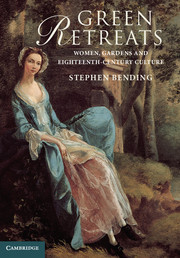1 - ‘Gladly I leave the town’: retirement
from Part I
Published online by Cambridge University Press: 05 August 2013
Summary
In the summer of 1747 George Oxenden, Charles Fielding, and Edward Coke leapt the fence of Lady Gray's estate at Denhill, Kent, and rode their horses through the newly created garden. Tearing up the lawn, scattering all before them, and riding through the previously tranquil bower and grove in pursuit of a hare, the riders’ explosion of rural sports in a widow's country retreat was only one of the more physical demonstrations of competing accounts of cultural space in the eighteenth-century countryside. The episode was celebrated in a poem by Nicholas Hardinge, entitled The Denhilliad, in which Hester Gray (1685–1781) appears a figure of innocent retirement, and her daughter – fearing for her shell-work vase – as the image of domestic sensibility. If the poem's sympathies are ostensibly with the women, its mock-heroic tone inevitably undercuts the seriousness of this violation of female space, and Hardinge relies upon and reiterates some of the more prevalent stereotypes of the woman in the landscape. In the Denhilliad, peace, tranquillity, innocence, sentiment, retirement, and gardening are aligned with a form of femininity unable to defend itself against a world of raucous, rustic masculine action; but while the men are made to look like rustic buffoons, the poem also laughs at the seriousness of the women's attachment to their garden, and avoids aligning itself too neatly with the importance of retreat. Acknowledging that a substantial garden has been created by Lady Gray, the poem also insistently feminises and eroticises that garden, and stresses not only the pity, but the delight, to be felt from delicate structures and soft borders being violated by men.
- Type
- Chapter
- Information
- Green RetreatsWomen, Gardens and Eighteenth-Century Culture, pp. 43 - 91Publisher: Cambridge University PressPrint publication year: 2013

